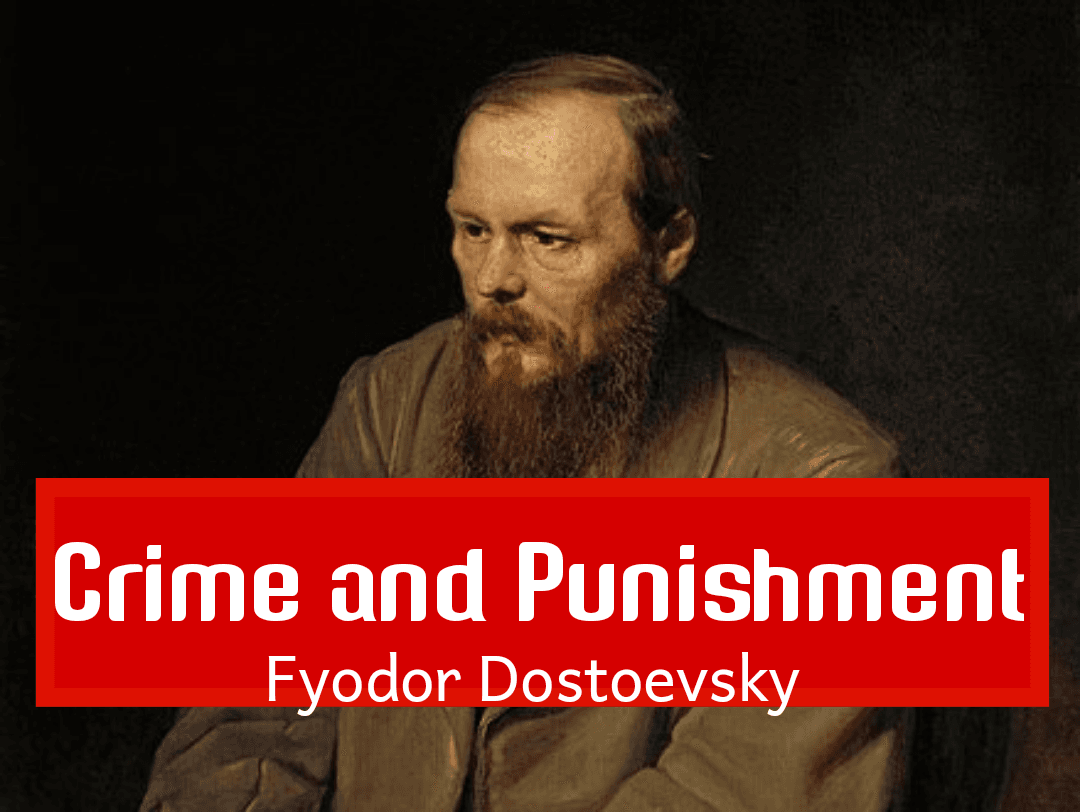There are books you read, get to the end, and think, “Well, that was a nice book.” And there are books you read and cannot get over. Crime and Punishment by Fyodor Dostoevsky is the latter for me. Reading it was like having a deeply spiritual, psychological and philosophical experience, all at the same time.

For those not familiar with the name Dostoevsky, in the world of literature, he is a Russian novelist considered to be one of the best novelists of all time. Crime and Punishment, published in 1866, is his most famous work. For a piece of writing to last for more than a century, it shows that there is something profound within its covers that resonates with people ages later.
While there are people more qualified to do the review of such a timeless work of literature, I am excited to share my takeaway in the hope that I will inspire you to read the book, and if you have, get you to revisit the feeling you had when you read it.
Secondly, the main takeaway I had is not only a timeless lesson but also a relevant one in today’s world and in our country, Kenya. There is a lot happening in the country. We are very volatile politically and in the trenches economically, evidenced by the lack of employment opportunities and the skyrocketing prices and taxes.
In the face of all of this, it’s easy to adopt a victim mentality. However, Crime and Punishment paints a picture of the torture and torment that we might encounter if we take on a victim mentality.
The plot
The book is long and rich, you can read it for a much more in-depth understanding. In this plot, I will only summarise the characters who are influential to this analysis.
Raskolnikov
Rodion Romanovich Raskolnikov is the protagonist in the book. He is a dropout from law school. He dropped out because he lacked funds. His family is poor and cannot support his life and studies in St. Petersburg. Therefore, he lives in a closet of an apartment, famished and sickly.
In the neighbourhood where he lives, there is a pawnbroker, Alyona Ivanovna. Alyona is not the best character. She is rude, condescending, and takes advantage of people. She also has a mentally-challenged sister, Lizaveta Ivanovna, who she exploits and physically abuses.
Raskolnikov has pawned a few items at Alyona’s. He has one last item to pawn, a watch passed down to him after his deceased father. But before he pawns the watch, an idea grows in him. What if he murders Alyona and steals her possessions? He will have enough to support himself and go back to school. That would also liberate Lizaveta from the hell her sister, Alyona, puts her through.
Dostoevsky does a stellar job of describing the developments that culminate in the murder of Alyona by Raskolnikov. However, after the murder, Raskolnikov’s plan falls apart. Lizaveta unexpectedly comes into the house to find her sister whacked with an axe. Before she could call for help, Raskolnikov murders her too. This catches him off guard and he is not able to rob as much as he had planned.
The two murders also start tormenting him. His internal struggle leads him to start being delusional. His sickness escalates, and he even faints when people around him discuss the murders.
The entire novel details his struggle to come to terms with his actions. Should he submit to his guilt or can he excuse himself? Should he confess or can he get away with it? Has he become a petty criminal or is he still the intelligent, sophisticated intellectual he thought himself to be?
Marmeladov
Semyon Marmeladov and Raskolnikov meet in a tavern and he starts his monologue narrating how he is a failure. He had just left his civil servant employment opportunity which he had gotten after his wife pressed hard for it. He is a miserable drunkard who cannot keep a job. He extorts his wife for a drink.
Due to his lack of responsibility, his eldest daughter, Sonia, barely 18 years old is forced into prostitution in order to provide for the family. Marmeladov takes from her too, in order to drink.
At last, he is run over by a horse cart and he dies.
Svidrigailov
Arkady Ivanovich Svidrigailov is an opportunist who gets married to an older woman of means. Dissatisfied, he sleeps around with his maidservants. He tries to sleep with Dounia, Raskolnikov’s sister, but is not successful. He then spreads the rumour that she wanted to sleep with him which cost Dounia her governess role.
Moreover, Svidrigailov is suspected to have murdered his wife, a servant in his house, and a child. While he is never remorseful nor does he admit to his wrongdoing, his inner self fights back by making him see ghosts and contend with them.
After his wife dies, he goes to St. Petersburg to meet Dounia. Dounia and her mother had left the village to meet her new suitor, Luzhin, and her brother, Raskolnikov. Svidrigailov follows them to the city to see if he still has a chance with Dounia.
While in the city he learns of Raskonikov’s murder secret and tries to blackmail him to get Dounia to marry him but it does not work. Dounia rejects his advances and he commits suicide.
Dounia
Avdotya Romanovna Raskolnikova (Dounia), Raskolnikov’s sister, is dignified and straightforward. After she loses her work as a governess, she is approached for a hand in marriage by Luzhin.
Luzhin is a man of means who is patriarchal. He wants to marry a poor girl so that he can oppress her with his wealth and position while she adores him.
However, Dounia is willing to sacrifice herself so that her mother and brother can be well provided for, and her brother can go back to school. Raskolnikov knows this and is against it. Eventually, they see Luzhin for who he is and his proposal is rejected.
Razumikhin
Dmitri Prokofych Razumikhin is Raskolnikov’s friend. He too is a dropout from law school. However, instead of hatching a plan to kill and steal, he took to translating French and German books to Russian for a living. An opportunity that he offers to Raskolnikov who turns him down.
Razumikhin is a positive person and a true friend. He sticks with Raskolnikov even when Raskolnikov mistreats him. He is genuine. Upon meeting Raskolnikov’s sister, he takes a liking to her and they eventually end up falling in love with each other.
Sonia
Sofya Semyonovna Marmeladov (Sonia) is the daughter of Marmeladov. She is barely an adult when she is forced into prostitution in order to feed the family. Although that life is difficult, she keeps her faith and morality.
She meets Raskolnikov the night her father dies. That night, Raskolnikov gives the family all the money he had, which is not much. That starts a conversation between them.
Raskolnikov sees something that he identifies with in Sonia. They are both unwanted in society. He gravitates towards her. The innocence and purity of Sonia endear her to him. He eventually confesses his murder to her. She tells him to confess it to the police. At first, he is against the idea but somehow Sonia’s influence on him is tremendous, he cannot escape it.
He confesses the murder and he is sent to prison in Siberia for an eight-year sentence. Even after confessing and being sentenced, Raskolnikov was still struggling with his conscience. He was never comfortable admitting that his actions were wrong. This made life difficult in prison.
However, one day when Sonia visits, he falls onto her feet and weeps. After he looks up, their eyes meet, and they both understand what has happened. His humanity has peered through. He sees the love Sonia has for him and he realises how much he loves her.
Sonia then gives him a Bible and Raskolnikov starts his redemption journey.
The victim mentality
Victim mentality refers to a psychological state in which an individual perceives themselves as a perpetual victim of external circumstances, often feeling powerless and helpless to change their situation. People with a victim mentality tend to attribute their difficulties, setbacks, and challenges primarily to external factors rather than taking responsibility for their own actions or choices.
This can lead to a belief that the world is inherently unfair and that they have no control over their circumstances. It allows individuals to shift blame rather than face potential criticism or consequences.
The murder of Alyona and Lizaveta Ivanovna is born of the adoption of the victim mentality by Raskolnikov, something that we can easily fall prey to. When he is forced to drop out of school and is languishing in poverty, he never takes responsibility, rather he blames the world.
First, he judges the pawnbroker, concluding that since she is not a good person, she does not deserve to have the possessions that she has. He, therefore, murders her so that he, ‘who is more deserving,’ can take the possessions. This mentality tells him that he has been dealt an unfair hand.
Secondly, he reasons that if he did something in the name of good he would become worthy. He thinks that by killing the pawnbroker and delivering Lizaveta from her tyranny, he will be worthy.
When you think of yourself as a victim, you delegate your agency to a force that takes you on a downward spiral rather than lift you up above your deplorable situation.
Comparing Raskolnikov to Razumikhin, his friend, they both were living in squalor. They had both dropped out of school due to poverty. However, Razumikhin sought something he could do, resulting in his upward trajectory in life.
Marmeladov and Svidrigailov represent effects of the victim mentality, a drunkard who cannot take care of his family and a murderer who tries to justify his heinous acts. Raskolnikov is murderous and struggles to justify his actions. He fights with his conscience and becomes miserable and sick as a result. The murder haunts him in his dreams and drives him insane. He contemplates suicide but unlike Svidrigaolov, he does not succeed. He grows apart from his family and his friends. He self-destructs and wallows in self-pity.
This can happen to us too if we embrace a victim mentality – we find fault in everything about the society around us. Worse is if we resort to murder. However, most of us do not get to that point. What we do is kill our dreams, hopes and ambitions and those of the people around us. Constantly feeling like a victim can lead to feelings of frustration, anger, sadness, and helplessness.
With a victim mentality, one may be less likely to take initiative, set goals, or work towards self-improvement because they believe their efforts are futile. Also, believing that external forces control one's life can lead to a reluctance to pursue opportunities, take risks, or venture outside one's comfort zone. We become enemies of progress.
One would often struggle to take responsibility for their actions, hindering personal growth and learning from mistakes. This mindset can lead to dependency on others for emotional support and problem-solving, as you believe you cannot handle challenges on your own. The belief in being a victim can become a self-fulfilling prophecy, as your actions and attitudes align with this perception, reinforcing the cycle of victimhood.
The Antidote
The antidote to the victim mentality and all the hellish experience that comes with it is to take on life as Dounia, Razumikhin and Sonia take it.
By no means have they been dealt a good hand. They are all poor. They all have bad things happening to them. But Razumikhin decides to do what he can, translate books. Dounia is willing to get married in order to provide for her family, and Sonia takes on prostitution to provide for the family too.
And although what Donia and Sonia did is not the best way to address their problems, they shunned away from thinking of themselves as victims. They saw a way out and took it without being bitter about life.
But most importantly, even when they had to make these hard choices, they never lost themselves. Sonia, especially, kept her innocence, her belief in God and her sense of self. Being able to resist being devoured by the world and the suffering she was going through is what attracts Raskolnikov to her. There is a light within her that shines and draws Raskolnikov, and even convinces him to confess. And after he is sent to Siberia, she follows him there where she is loved by the people and Raskolnikov's fellow prisoners.
If you ask me, Sonya embodies the story of Christ which is a motif in the book. Despite being persecuted, she does not give in to the evil around her and her goodness is used to transform those around her with love.
The takeaway
No matter what you have to do, do not give in to the victim mentality. Even when you are in the deepest, darkest dungeons, there is something you can do. Guard your agency with all you have. Avoiding the victim mentality involves cultivating a healthy and empowered mindset that focuses on taking control of your life and responding to challenges.
The world today is not a very nice place. There is a lot of suffering going around. In Kenya, things are getting worse by the day. The other day our Deputy President said to graduates that there are no jobs and it is up to them to create the jobs while billions are being embezzled in the government. People have not recovered from the pandemic and taxes are being hiked left, right, and centre. The price of commodities is increasing astronomically.
But even having been dealt this difficult hand, do not succumb to the victim mentality. Take charge of your agency. Pay attention to your thoughts, emotions, and reactions. Notice when you start attributing your problems solely to external factors. Developing self-awareness is the first step in breaking free from victim thinking. Acknowledge your role in your circumstances.
When you catch yourself thinking in a victim-like manner, challenge those thoughts. Instead of dwelling on problems, shift your focus to finding solutions. Learn to reframe challenges as opportunities for growth. Take proactive steps to address challenges and work toward your goals. You do not need to see the whole staircase, just the next step. Take the next step. Within you lies the light that the world is waiting for to light the way.





